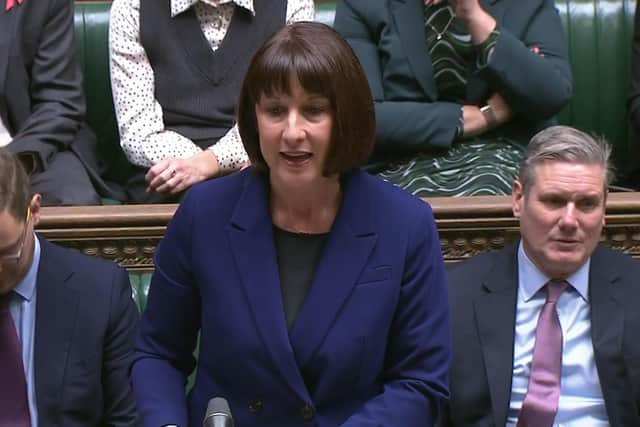Autumn Statement: Rachel Reeves says workers are ‘worse off’ despite tax cuts
She told MPs working people ”are still worse off” as they are struggling in a stagnant economy, with the highest tax burden since the Second World War, high inflation and rising mortgage payments.
Ahead of next year’s general election, Chancellor Jeremy Hunt promised to cut the main rate of Employee National Insurance in January – from 12 per cent to 10 per cent – and said this will save someone earning £35,000 more than £450 a year.
Advertisement
Hide AdAdvertisement
Hide AdHe confirmed that a tax break allowing firms to cut their bills if they invest in new equipment will be made permanent, in what he claimed was the “biggest business tax cut in modern history”.


The Chancellor also vowed to increase the minimum wage, to £11.44 an hour from April 2024, raise benefits by 6.7 per cent – in line with September’s inflation figure – and maintain the triple lock on pensions.
The changes reduce the tax burden by 0.7 percentage points compared with forecasts in March, but it continues to rise year-on-year and is due to reach a post-war high of 37.7 per cent of GDP by 2028-29.
Ms Reeves said the government previously introduced tax rises “worth the equivalent of a 10p increase” on National Insurance so a 2p cut is no cause for celebration.
Advertisement
Hide AdAdvertisement
Hide AdShe also criticised Mr Hunt for refusing to change thresholds for income tax, as it means millions of people have either been brought into tax for the first time or moved into higher bands after receiving pay rises.
The Office for Budget Responsibility (OBR) said that between 2022 and 2029 more than four million extra individuals will be earning above £12,750, leaving them liable for income tax, while three million more will move into the 40 per cent higher rate band.
The fiscal watchdog has also downgraded its forecast for growth – claiming the Government will miss the targets it set over the following three years.
“Growth has hit a dead end,” said Ms Reeves. “Over the next two years, no fewer than 177 countries are forecast by the IMF to grow faster than the UK. And next year, we are forecast to be the slowest growing economy in the whole of the G7.”
Advertisement
Hide AdAdvertisement
Hide AdThe Shadow Chancellor accepted that inflation fell to 4.7 per cent last month, but said that is more than double the Bank of England’s target rate and the cost-of-living crisis is far from over.
She also said homeowners are still struggling with interest rate rises introduced in the wake of Liz Truss’s “kamikaze budget”, as those who have re-mortgaged since July have seen their monthly bills rise by an average of £220 a month.
The OBR also has stated inflation is expected to “remain higher for longer”, taking until the second quarter of 2025 to return to the Bank of England’s 2 per cent target.
According to its forecasts, national debt is expected to reach 91.6 per cent of GDP next year and peak at 93.2 per cent in 2026-27, before declining to 92.8 per cent in 2028-29.
Advertisement
Hide AdAdvertisement
Hide Ad“This is a product of their failures over 13 years,” said Ms Reeves. “A Tory government that has failed on growth. Failed on debt. Failed on levelling up. And failed on the cost of living too.
“Now they expect the British people to believe them when they say they’re going to turn it all around.”
She added: “We all know working people are worse off under the Conservatives: With growth down, mortgages up, prices up, taxes up, debt up, and their time is up. It is time for change.”